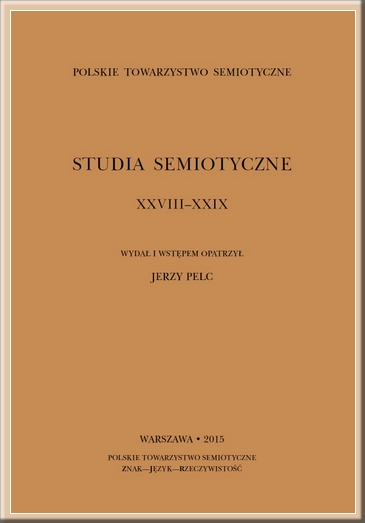Abstract
DOI: http://doi.org/10.26333/sts.xxviii.18
In the present study, I consider the world as a set of occurrences, including human activities. These occurrences construct a feedback with the multiple sets of propositional attitudes that I call cultures. At the same time, it is thanks to a reference to cultures that the occurrences are ordered. On the other hand, the already mentioned sets of attitudes reflect appropriate languages and through them – the dictionaries which are used. The analysis of the latter allows us to see the manners of ordering the world of occurrences, among others with the use of actions, including the applied dictionaries. What is more, a comparison of thought of different dictionaries allows us to grasp this world in terms of plasticity because the shape of the visible world depends on the dictionary – one can be poorer, the other richer. In the present study, I give two examples which perceive this difference. Both of them come from social sciences and humanities. I am convinced that by acting, including acting with the use of words, an individual changes the world, and at the same time changes their self.
References
Abu-Lughod Lila. 1991. Writing Against Culture. W Recapturing Anthropology. Working in the Present, R. G. Fox (red.), 137–162. Santa Fe: School of American Research Press.
Ajdukiewicz Kazimierz. 1960. Język i znaczenie. W Język i poznanie, t. 1, 145–174. Warszawa: PWN.
Davidson Donald. 1992. Interpretacja radykalna. W Eseje o prawdzie, języku i umyśle, tłum. P. Józefowicz, 95–117. Warszawa: Wydawnictwo Naukowe PWN.
Davidson Donald. 2001. The Second Person. W Subjective, Intersubjective, Objective, 107–121. Oxford: Oxford University Press.
Durkheim Émile. 1968. Zasady metody socjologicznej. Tłum. J. Szacki. Warszawa: PWN.
Foucault Michel. 1998. Trzeba bronić społeczeństwa. Tłum. M. Kowalska. Warszawa: Wydawnictwo KR.
Frege Gottlob. 1977. Myśl. W Pisma semantyczne, tłum. B. Wolniewicz, 101–129. Warszawa: PWN.
Malinowski Bronisław. 1984. Zwyczaj i zbrodnia w społeczności dzikich. W Zwyczaj i zbrodnia/Życie seksualne dzikich. Dzieła, t. 2, tłum. J. Chałasiński, A. Waligórski, 5–96. Warszawa: PWN.
Malinowski Bronisław. 1999. "Dziennik w ścisłym znaczeniu tego wyrazu". Konteksty 3 : 96-110.
Mauss Marcel. 1973. Szkic o darze. W Socjologia i antropologia, tłum. M. Król. K. Pomian, J. Szacki. Warszawa: PWN.
Marr Vivian et al. (red.). 2011. The Chambers Dictionary. London: Chambers Harrap Publishers.
Quine Willard Van Orman. 1997. Na tropach prawdy. Tłum. B. Stanosz. Warszawa: Wydawnictwo Spacja.
Quine Willard Van Orman. 1999. Słowo i przedmiot. Tłum. C. Cieśliński. Warszawa: Fundacja Aletheia.
Soanes Catherine, Angus Stevenson (red.). 2003. Oxford Dictionary of English. Oxford University Press.
Rabinow Paul. 2007. Marking Time. On the Anthropology of the Contemporary. Princeton University Press.
Rabinow Paul, George E. Marcus, James D. Faubion, Tobias Rees. 2008. Designs for an Anthropology of the Contemporary. Durham - London: Duke University Press.
Winch Peter. 1995. Idea nauki o społeczeństwie i jej związki z filozofią. Tłum. B. Chwedeńczuk. Warszawa: Oficyna Wydawnicza.
Wittgenstein Ludwig. 1972. Dociekania filozoficzne. Tłum. B. Wolniewicz. Warszawa: PWN.
Zaporowski Andrzej. 2003. Obraz kultury w świetle wybranych modeli stosunków międzyludzkich. W Konstruktywizm w humanistyce, A. Pałubicki, A. P. Kowalski (red.), 107–118. Bydgoszcz: Oficyna Wydawnicza Epigram.
Zaporowski Andrzej. 2006. Czy komunikacja międzykulturowa jest możliwa? Strategia kulturoznawcza. Poznań: Wydawnictwo Naukowe UAM.
Zaporowski Andrzej. 2010. Konsekwencja kontaktu międzykulturowego: współpraca czy konflikt? W Obrazy migracji, K. Ilski (red.), 69–77. Poznań: Instytut Historii UAM.
Zaporowski Andrzej. 2013. "Hybrydowy charakter współczesności i kultury. Studium krytyczne". Studia Kulturoznawcze 1 (3) : 125–143.
Zaporowski Andrzej. 2013. "Kultura w świetle amerykańskiej antropologii współczesności". Lud 97 : 175–194.

